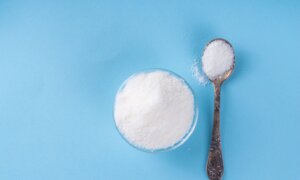Fulvic acid (and its related humic compound, humic acid) has been lifted out of obscurity in recent years, largely because of growing awareness among health-conscious consumers and free advertising provided by social media users touting its benefits.
Fulvic and humic acids both are commonly used in agriculture to support soil health, but fulvic acid in particular has seen therapeutic use in humans grow significantly in recent years.
“The global pharmaceutical grade fulvic acid market is expected to reach US$ 1.6 billion by 2030, with an annual growth rate of more than 10.8%,” GlobalNewswire reports.
Not Just for Soil
Although research supporting the potential health benefits of fulvic acid is still limited, a growing body of evidence suggests this organic compound, when taken as a supplement, may play a notable role in treating common health conditions, in particular immune health, gut health, and chronic inflammation.
Fulvic acid is a naturally occurring chemical component of humus (organic matter formed over centuries as plants and animals move through cycles of decomposition). Fulvic acids can be found in various locations and environments, including mountainous regions, streams, rivers, and clay, and it can be extracted and processed into a supplement that is usually sold in liquid or capsule form.
A closely related compound, shilajit (or “mineral pitch”), is a sticky, tar-like substance collected primarily from the crevices of Himalayan mountain rock. It’s high in fulvic and humic acids and has been used medicinally for thousands of years in India and Nepal as an anti-aging and rejuvenating tonic, as well as to treat altitude sickness and a variety of ailments. It’s thought that shilajit’s effectiveness is largely due to its high levels (approximately 15 to 20 percent) of fulvic acid, although it’s also rich in many different minerals.
The Many Benefits
In the Western world, research on the potential benefits of fulvic acid has increasingly supported its potential use in helping a number of ailments, from chronic inflammatory conditions such as diabetes to Alzheimer’s prevention. The problem is that, although fulvic acid (primarily via shilajit), has been used extensively in Eastern medicine, most scientific research has been limited to test tubes and animal studies, and studies examining the effects of fulvic acid on humans are still limited and have produced some mixed results.
A September 2018 review published in the Journal of Diabetes Research highlights numerous animal studies that indicate that fulvic acid has anti-inflammatory and anti-allergy effects, that it supports increased nutrient absorption, and that it holds promise as a treatment for Type 2 diabetes.
The study authors conclude that the information in their review indicates that “FvA [fulvic acid] can act as an immune modulator, influence the redox state, and potentially affect gut health,” and that although research to date has been minimal, “there is substantial evidence to pursue FvA research in preventing chronic inflammatory diseases, including diabetes.”
Fulvic acid also seems to have the potential as a protective agent against neurodegenerative disorders. A 2011 research article in the Journal of Alzheimer’s Disease shows that fulvic acid acts to inhibit the buildup of certain proteins that characterize the progression of Alzheimer’s.
Another reason fulvic acid has stirred interest in recent years is because of its potential role as a chelator, which works as a detoxifying agent to promote the removal of heavy metals like arsenic and lead from the body, as well as to increase absorption of beneficial minerals.
More Research Needed
It’s important to note that since there is limited research on the specific effects of fulvic acid in humans, reliable dosing guidelines for safety have yet to be determined.
Some studies have indicated that, at higher doses, fulvic acid supplementation can actually be harmful, resulting in oxidative damage. Also, fulvic acid supplements can interfere with certain medications, so for those interested in fulvic acid supplementation, it’s advisable to consult with a knowledgeable medical professional before starting a supplement regimen.
“People with specific medical conditions, such as kidney disease, should exercise caution when using fulvic acid supplements. These substances may affect the balance of minerals in the body and could potentially impact kidney function,” Trista Best, a registered dietitian, environmental health specialist, adjunct nutrition professor, and consultant with Balance One Supplements, told The Epoch Times.
Fulvic acid and shilajit both offer potentially significant health benefits, depending on your individual needs and goals.
“It’s essential to emphasize that while these potential benefits exist, much of the research is in the early stages. Additionally, the quality and safety of fulvic and humic acid supplements can vary widely, so if you are considering their use, it is important to consult with a health care professional and choose reputable sources.”
For those considering fulvic acid supplementation, it’s important to be sure that the product is purified and third-party tested since raw, unpurified fulvic acid or shilajit has been found to contain harmful substances including mycotoxins, heavy metals, and free radicals.














